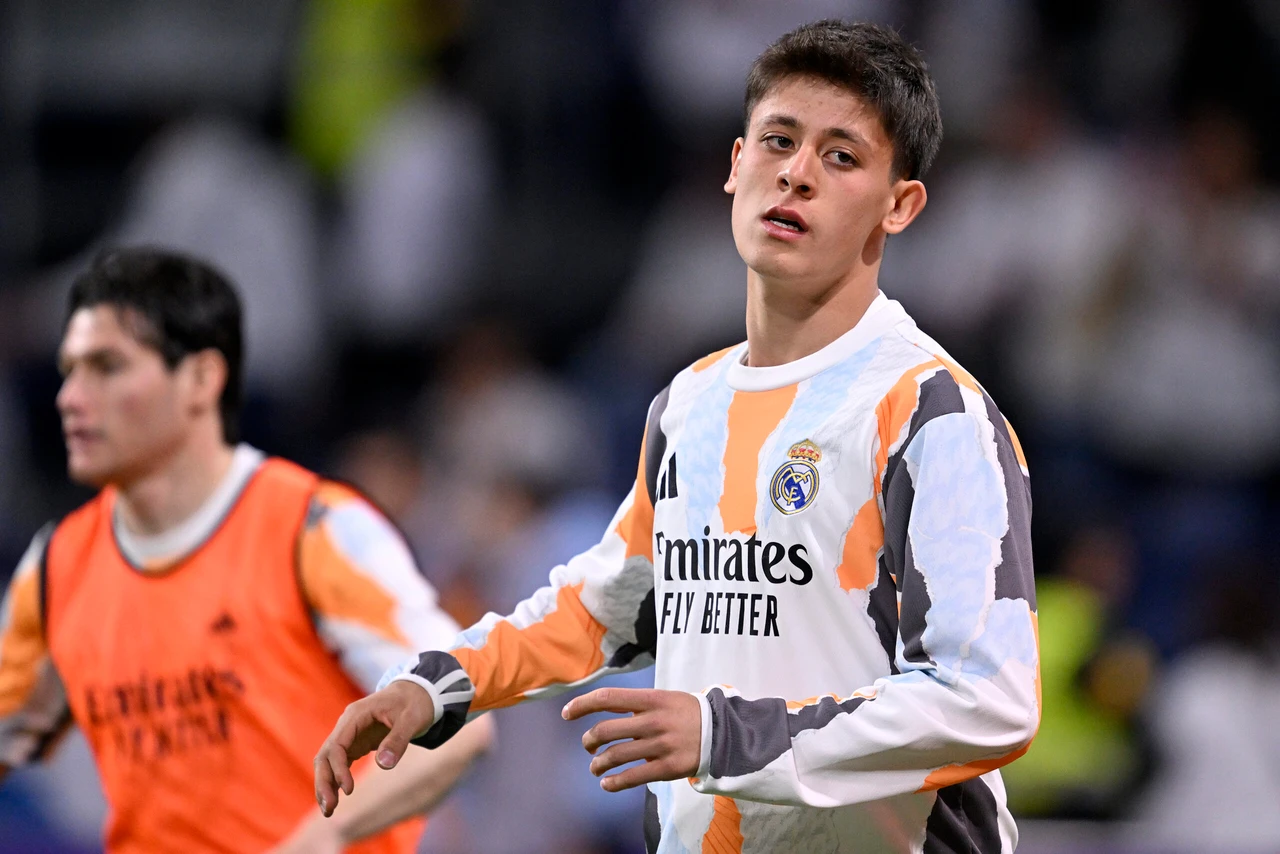Olympics opening ceremony sparks outrage with drag queens parodying Last Supper
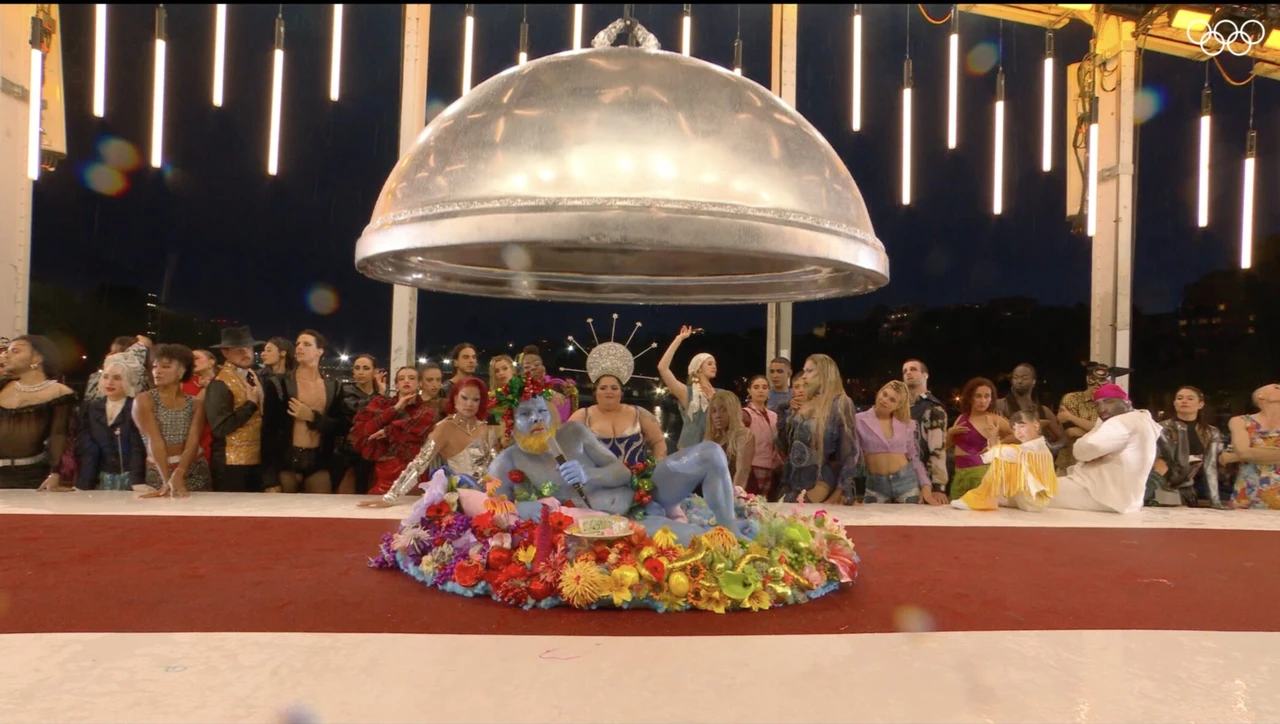 Drag queens perform during the Opening Ceremony of the Paris Olympics, on July 26, 2024. (Photo via X / @OlympicsParis)
Drag queens perform during the Opening Ceremony of the Paris Olympics, on July 26, 2024. (Photo via X / @OlympicsParis)
Drag queens parodied Leonardo da Vinci’s rendition of the Last Supper during the opening ceremonies of the 2024 Paris Olympics on Friday evening, creating international outrage.
The performance, which took place against the backdrop of the Seine River and the Eiffel Tower, aimed to interpret the Greek God Dionysus and highlight the absurdity of violence between humans, according to the Olympics’ statement on X.
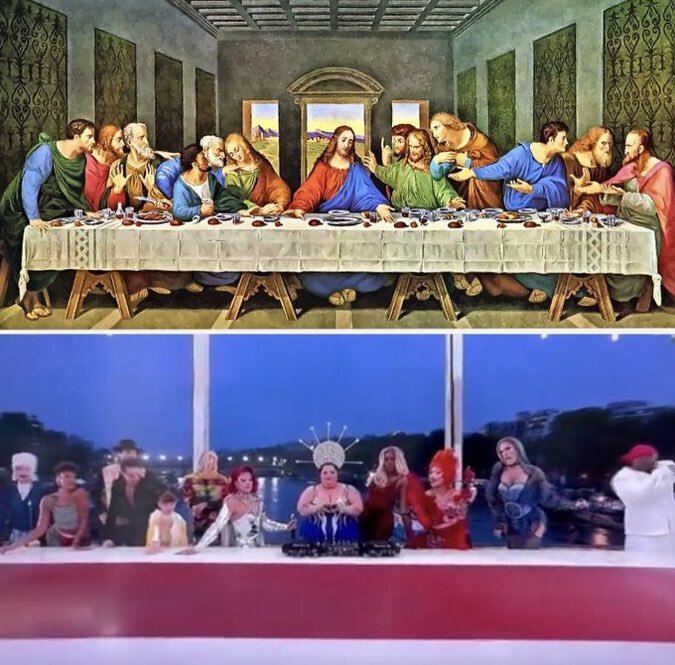
Performance details
Eighteen performers re-created the Last Supper scene, depicting Jesus Christ’s final meal with his disciples before his crucifixion.
The burlesque performance featured half-naked participants, with a central figure painted blue and covered only in vines, symbolizing Dionysus. This figure sat surrounded by flowers at a long table, flanked by other performers, including a woman adorned with a halo.
The event also included a fashion show featuring drag performers making suggestive runway walks. Among the 18 drag performers were several well-known Drag Race France personalities who struck poses behind the table.
The woman at the center wore a low-cut dress and a large silver headdress reminiscent of Jesus’s halo in traditional depictions. She made a heart shape with her hands before the group broke into a dance routine. Models later took the stage for an impromptu fashion show while the Last Supper characters swayed on the sidelines.
A large serving tray was brought on stage, revealing a scantily clad man painted blue, evoking Dionysus.
The official Olympic Games profile on X stated that the performance aimed to highlight the absurdity of violence between humans.
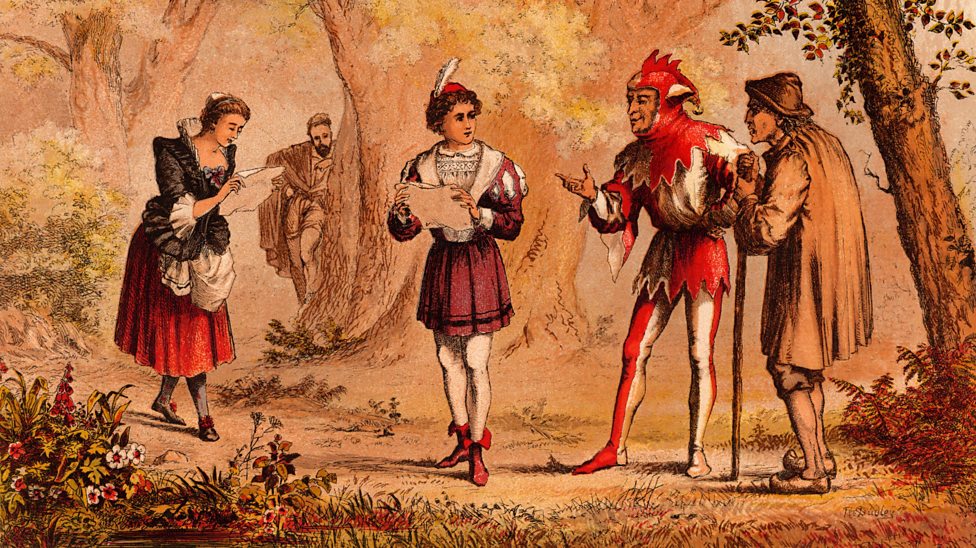
What is a drag queen?
Drag is a theatrical exaggeration of gender, often involving performers dressing and acting in a style associated with the opposite gender. According to Joe E. Jeffreys, a drag historian and adjunct instructor at New York University, drag constantly subverts societal expectations of gender norms. It is an art form that has affirmed and uplifted LGBTQ individuals for over a century.
The term “drag” likely originates from the way gowns “dragged” across the floor or from Polari, a slang used by queer British men. One of the earliest known drag performers was William Dorsey Swann, a formerly enslaved man who hosted drag dances in the 1880s. Swann’s defiance in the face of police raids marked early resistance in the queer liberation movement.
Drag began out of necessity in Shakespearean theatre when men played female roles due to the absence of actresses. Over time, it evolved into a way for men to explore different facets of their identity through exaggerated feminine personas. Drag queens, who adopt exaggerated male personas, also challenge gender norms.
Reactions, criticism
Telecommunications company C Spire withdrew its advertising from the Paris Olympics, citing the offensive nature of the performance. “We were shocked by the mockery of the Last Supper during the opening ceremonies,” C Spire posted on X. This decision was publicly supported by Mississippi Governor Tate Reeves.
Political figures
Many internationally known political figures, particularly from American politics, condemned the display.
- Marion Marechal, a conservative French politician and European Parliament member criticized the performance: “To all the Christians of the world who are watching the #Paris2024 ceremony and felt insulted by this drag queen parody of the Last Supper, know that it is not France that is speaking but a left-wing minority ready for any provocation. #notinmyname.”
- Kyle Becker, a journalist, described the opening ceremony as “full woke dystopian”: “The 2024 Paris Olympics has gone full Woke dystopian. The opening ceremony was filled with a transgender mockery of the Last Supper, the Golden Calf idol, and even the Pale Horse from the Book of Revelation. The Olympics has made it clear that Christian viewers aren’t welcome.”
Religious leaders
Religious leaders were particularly vocal in their disapproval.
- The French Bishops’ Conference expressed deep disappointment, describing the scenes as a “mockery of Christianity.” In their statement, they acknowledged the beauty and joy of the ceremony but deplored the derisive scenes.
- Archbishop Vincenzo Paglia of the Vatican’s Pontifical Academy for Life and Archbishop Charles Scicluna of Malta issued strong statements against the performance, with Scicluna lodging a formal complaint with the French ambassador to Malta.
- Bishop Andrew Cozzens of Crookston, Minnesota, urged Christians to respond with prayer and fasting, highlighting the irony of witnessing a mockery of the Mass shortly after a large gathering to venerate the Eucharist.
- Bishop Robert Barron of Winona-Rochester described the parody as reflecting a “deeply secularist postmodern society” and urged Christians to make their voices heard.
Athletes, celebrities
- Harrison Butker, an NFL player, quoted scripture to condemn the performance: “Be not deceived, God is not mocked. For what things a man shall sow, those also shall he reap. For he that soweth in his flesh, of the flesh also shall reap corruption. But he that soweth in the spirit, of the spirit shall reap life everlasting. Galatians 6:7-8.”
- Riley Gaines, an athlete, criticized the inclusion of drag performers at the Olympics: “Men in wigs front & center at the Olympic Games. No one ever tells me this group is ‘oppressed’ or ‘marginalized’ again.”
- Elon Musk criticized the display, saying: “This was extremely disrespectful to Christians.”
Support, defense
While the backlash was significant, some praised the performance.
- Thomas Jolly, the artistic director, defended his work, stating he intended to send a message of love and inclusion, not to mock or shock: “Most of all, I wanted to send a message of love, a message of inclusion and not at all to divide.”
- Out Magazine, an LGBTQ publication celebrated the moment as a significant breakthrough for drag performers: “Queens everywhere had this huge moment for drag performers breaking through the mainstream and showing their talents to the entire world.”
- President Emmanuel Macron supported the performance: “This is France.”
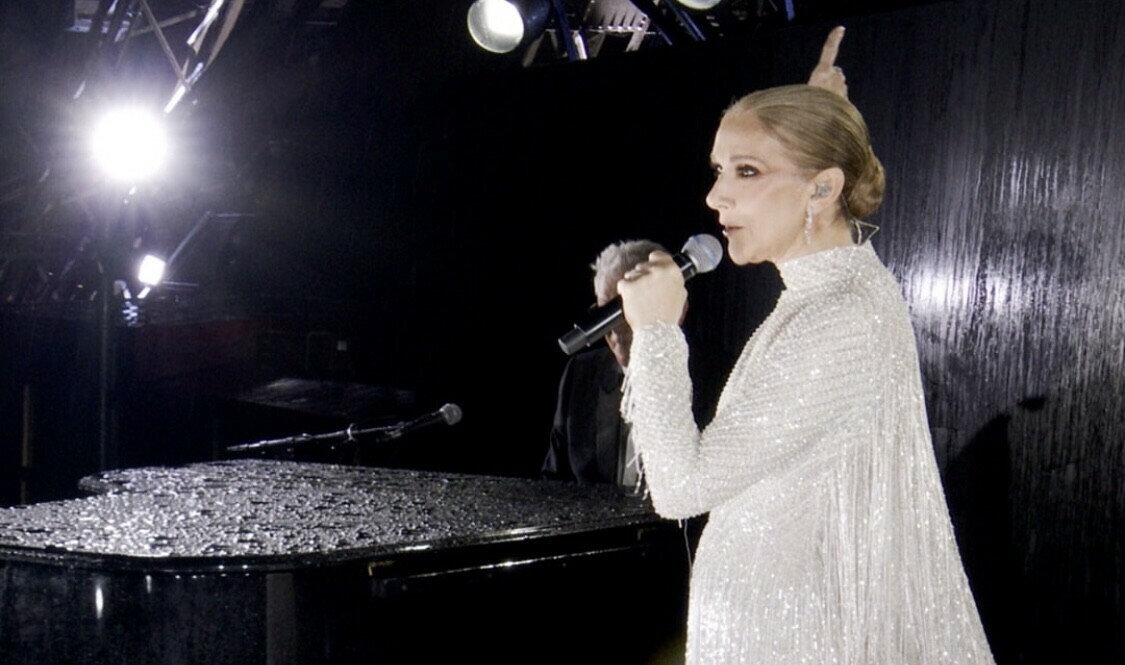

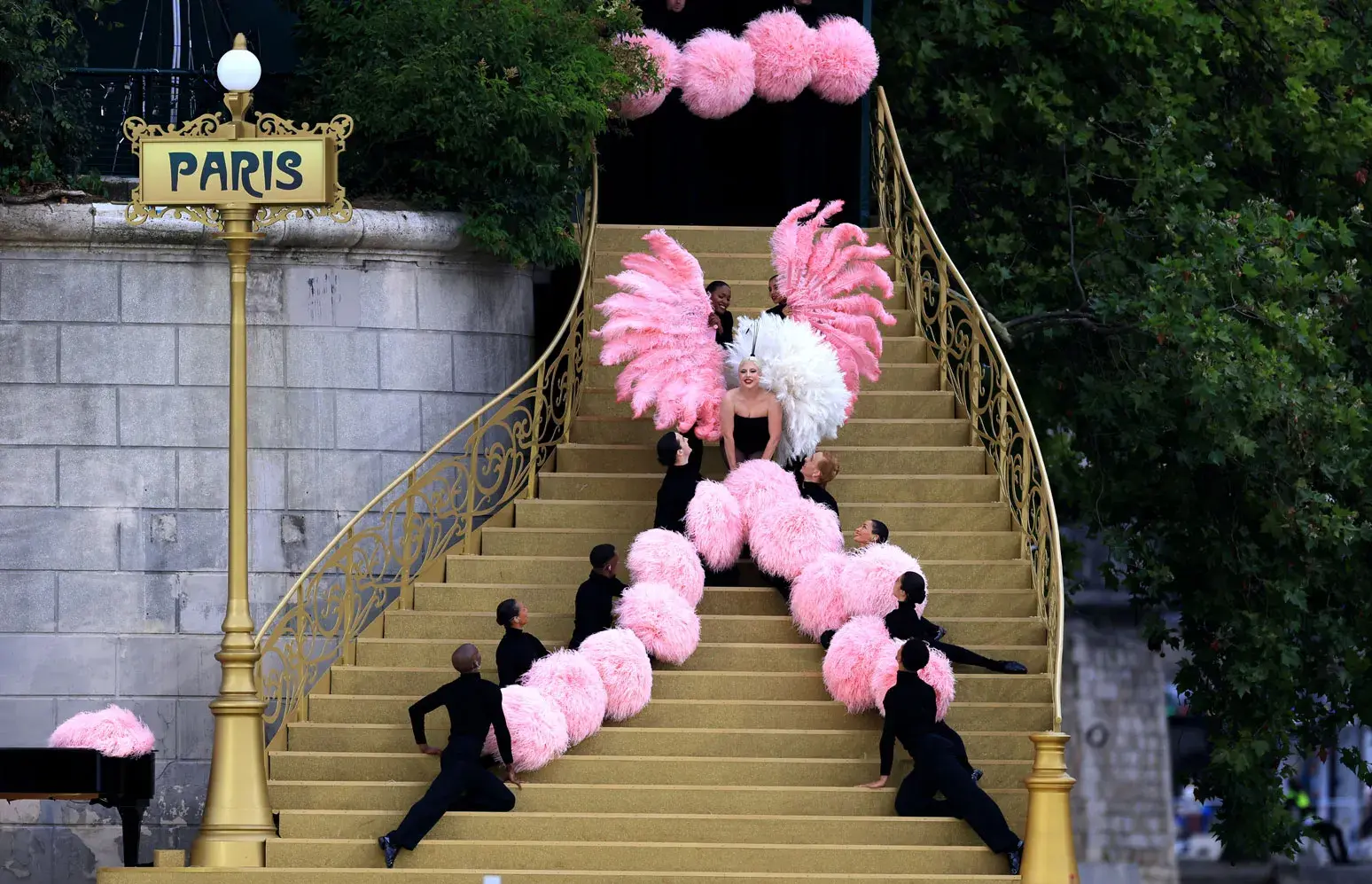
Additional performances
The opening ceremony also included performances by:
- Lady Gaga, paying tribute to French dancer and singer Zizi Jeanmaire near the River Seine.
- Celine Dion, performing by the Eiffel Tower.
- Snoop Dogg, participating in a torch-bearing act.


